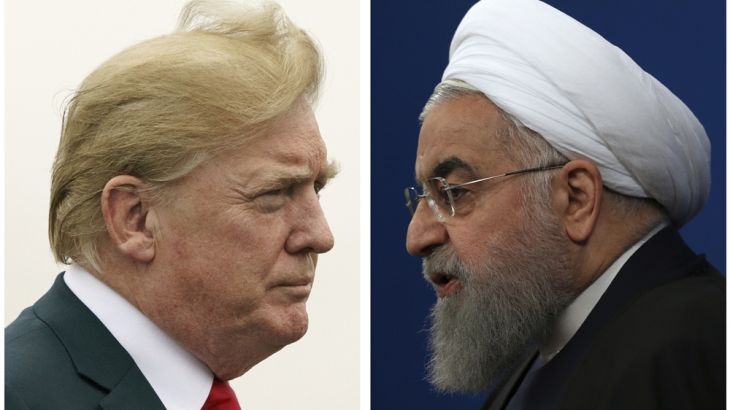Iran vows to continue oil exports despite Trump’s threats
Tehran says it will stand firm against Washington as US president issues warning against countries trading with Tehran.

Iranian President Hassan Rouhani has vowed that Iran will stand firm against threats by the United States over oil shipments after Washington reimposed economic sanctions on the Islamic republic.
Speaking to state broadcaster IRINN on Wednesday, Rouhani said: “If the Americans want to keep this simplistic and impossible idea in their minds, they should also know its consequences.”
Keep reading
list of 4 itemsWho will be Iran’s next president? | Start Here
Oil slumps two percent on possible return of Iranian supply
Border security a common concern for Pakistan and Iran: Rouhani
“They can’t think that Iran won’t export oil and others will export.”
Rouhani did not specify what consequences the US could face, but in the past, Iranian officials have threatened to block the Strait of Hormuz, a major shipping route in the Middle East, in retaliation for any US actions.
The US has dismissed the threat as a bluff.
During his meeting with North Korean Foreign Minister Ri Yong-ho in Tehran on Wednesday, Rouhani warned him that the US was “an unreliable and untrustworthy” negotiating partner that did not honour “any of its commitments”.
Ri was also quoted as describing the sanctions against Iran as “inappropriate and contrary to international standards”.
North Korea is under US and UN sanctions over its nuclear weapons programme.
The first round of reimposed US sanctions targeting Iran’s aviation and auto industries as well as its banking system snapped back on Tuesday. A second round of sanctions against its energy sector will be reimposed on November 5.
Countries like Russia, China and Turkey, however, have said that they would not abide by the US sanctions, and would continue to trade with Iran.
On Wednesday, China’s foreign ministry said it opposed the US’ “unilateral sanctions” and “long-armed jurisdiction”, adding that its business ties with Iran were “open, transparent and lawful”.
![Infographic by Alia Chughtai [Al Jazeera]](/wp-content/uploads/2018/08/ebb4589121c9439e935dd326238e2264_6.jpeg)
“China’s commercial cooperation with Iran is open and transparent, reasonable, fair and lawful, not violating any United Nations Security Council resolutions,” it said.
“China’s lawful rights should be protected.”
China, Iran’s top oil customer, buys roughly 650,000 barrels a day of crude oil from Tehran, or seven percent of China’s total crude oil imports.
At current market rates, the imports are worth about $15bn.
State energy firms CNPC and Sinopec have invested billions of dollars in key Iranian oil fields such as Yadavaran and North Azadegan, from which they send oil to China.
Turkey’s Energy Minister Fatih Donmez also said that his country would continue to buy natural gas from Iran. Turkey buys an estimated 9.5bn cubic metres of gas from Iran.
European countries have also vowed to protect the nuclear deal by continuing to trade with Iran.
Trump threat
|
|
Signed in 2015, the landmark deal was meant to lift sanctions against Iran in return for curbs in its nuclear programme.
Despite opposing claims from the US and Israel, researchers from the International Atomic Energy Agency (IAEA) maintain that Iran continues to abide by its commitment in the deal.
Since it unilaterally pulled out of the deal in May, Washington has told other countries that they must halt all imports of Iranian oil from November 4, or face US financial measures.
On Tuesday, US President Donald Trump wrote on social media that “anyone doing business with Iran will NOT be doing business with the United States”.
Trump’s National Security Advisor John Bolton told Fox News that the US policy “is not regime change, but we definitely want to put maximum pressure on the government”.
German Foreign Minister Heiko Maas, however, warned that the unilateral US sanctions could further destabilise the Middle East and boost “radical forces” in the region.
“Isolating Iran could boost radical and fundamentalist forces,” he said, adding that “chaos in Iran, as we have experienced in Iraq or Libya, would further destabilise an already troubled region”.
Meanwhile, Italian Foreign Minister Moavero Milanesi said that “agreements have to be respected”.
“We are in solidarity with the European Union position, obviously we are closely monitoring this and we are doing everything possible on the diplomatic level to stimulate a direct dialogue between the United States and Iran, and we think that dialogue should always prevail,” he said.
Also on Wednesday, Iranian Foreign Minister Javad Zarif said it was hard to imagine new talks with the US with its erratic decision-making.
“America has zigzagged constantly, so now no one trusts them,” he said.
In late July, Trump, who has repeatedly criticised Iran’s leaders, said he was willing to meet with them with no preconditions – even though US Secretary of State Mike Pompeo later walked back some of the president’s comments.
|
|